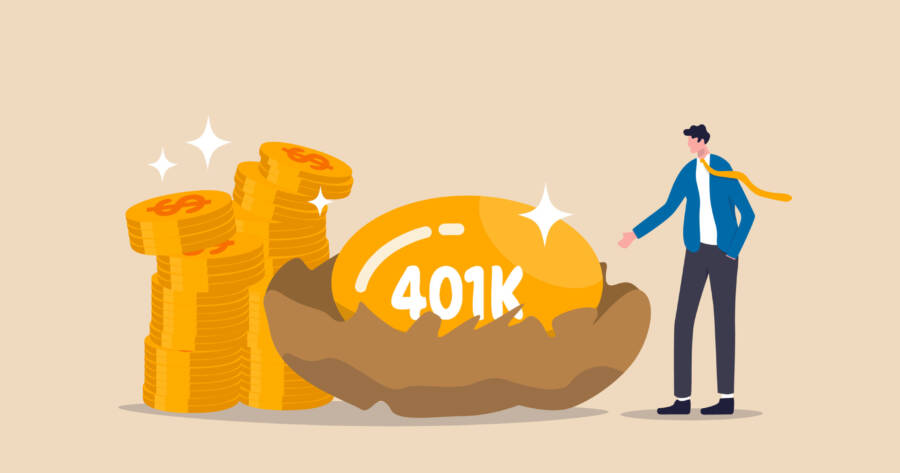One of the important questions you need to ask yourself is whether or not you are saving enough in your 401k for retirement. After all, your retirement represents the life you are going to live when you are older and the balance accumulated in your 401k should represent a significant portion of your nest egg. If you want to be able to retire and live the life you want, it’s important to ask yourself this simple question: “how much should I put in my 401k?” Consider your options and then make sure you are saving enough.
How Much Should I Put in My 401k?
The maximum allowable employee contribution you can make to a 401k is $19,500 in 2021. This doesn’t include any employer matches though, so any amount the company adds on your behalf is extra. I know putting $20k towards a 401k sounds like too much, but do it consistently and you won’t have to worry about retirement savings.
Those who start young can consider a slightly less aggressive approach. With time on your side for compound interest to work its magic, a good starting point is to contribute 10% to 20% of your salary. And if you can swing it, I highly recommend turning on the automatic escalation. With this feature toggled, you can tell your employer to increase your employee contributions by 1% every year. By slowly increasing your contributions and timing it with promotions and inflation adjustments, you won’t see as much (if any) of a reduction in take home pay and before you know it, you would have a large nest egg.
Use Fidelity’s Rule of Thumb as a Guide
According to Fidelity’s viewpoint, retirees should have ten times their income saved by the time they retire at 67. They further explain that you should have:
- 1x your salary by age 30.
- 2x by 35.
- 3x by 40.
- 4x by 45.
- 6x by 50.
- 7x by 55.
- 8x by 60.
- And 10x by 67.
With these numbers, Fidelity is assuming that retirees are targeting to replace 45% of their income from their nest egg and using Social Security to cover the rest of their needed expenses.
These are rough milestones, but use the numbers to see if you need to add more or less to your 401k.
Assume a Realistic Return for Your 401k Contributions
It’s common to assume that you will be able to see returns of 10% or even 12% annually. However, even though investing can be a good way to build wealth over time, basing your retirement planning on those types of returns is foolhardy. Stock and bond valuations are very high and it’s likely that we won’t see historical returns in the next 10 or maybe more years. The longer term returns past the next decade is even harder to predict, but shoot for 7% annualized or less over time.
It’s better to plan for lower returns and save more than to assume that you will see big returns. Make sure that you have realistic expectations for your returns, and set aside more than you might think you need.
Start Saving Your 401k Immediately
Another thing that can make a big difference in how much you end up with is when you begin. With the generous benefits of the tax code, putting money into a 401k should be a priority. Just starting five years earlier can make a big difference. Plus, the longer compound interest has to work on your behalf, the better off you’ll be in the long run. You can even set aside a little bit less each month the longer you plan to save. Start now to save and then look for ways to increase your 401k saving until you hit the max. It’s vital to your future financial health that you do what you can to improve your situation. The more you do now, the better your retirement is likely to be.
What If Even 10% is Too Much?
For those who haven’t saved anything, I know it’s very hard to get started. But no matter what, you should at least contribute enough to get the employer match. A popular employer matching scheme is to match 50% of your first 6% of your salary. Let’s say that’s what your employer gives. For someone who make $50,000 a year that can contribute 6% (or $3,000) a year, they will get $1,500 for free. $3,000 still sounds like a lot, I know, but do your best. That’s a little over $115 a paycheck. Find ways to spend less on what you already spend money on. Figure out what you can cut out of your budget. Think about it. Saving for retirement is still going to benefit you. It’s not like you lose the money you saved in your 401k.
The Bottom Line
Once you are in the habit of saving, then start increasing your 401k contributions. We already talked about activating the automatic escalation feature. You should also cut out some more of the unimportant spending items on your list and manually increase your contribution percentage. You can even find ways to make more money and put that into your retirement portfolio. Known as a solo 401k, your side hustles can have its own 401k where you put even more towards your retirement with favorable tax treatment. The bottom line is that when you can, find ways to improve your 401k contributions.
In the end, there are guidelines but they really just offer a starting point. At the end of the day and for just about everyone, the more you put in your 401k, the better off you will be. Decide that you want to improve your financial future and prepare better for retirement. You’ll be glad you did.
